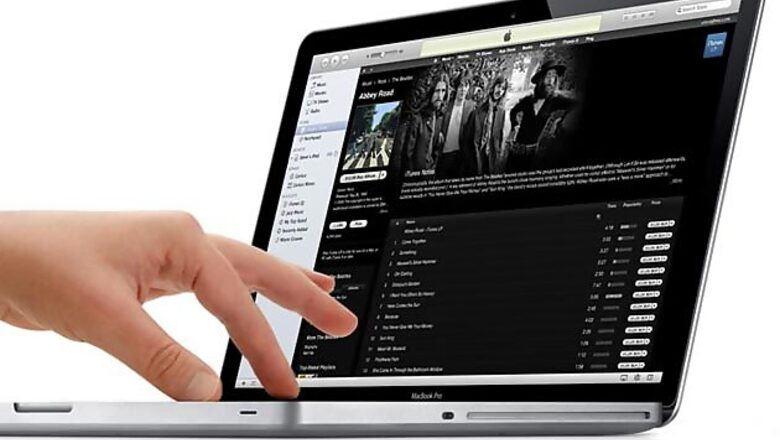
views
New York: When Apple launched its iTunes music store a decade ago amid the ashes of Napster, the music industry - reeling from the effects of online piracy - was anxious to see how the new music service would shake out.
"The sky was falling, and iTunes provided a place where we were going to monetize music and in theory stem the tide of piracy. So, it was certainly a solution for the time," said Michael McDonald, who co-founded ATO Records with Dave Matthews and whose Mick Management roster includes John Mayer and Ray LaMontagne.
The iTunes music store became much more than a solution; it changed how we consume music and access entertainment. It's not only music's biggest retailer, it also dominates the digital video market, capturing 67 per cent of the TV show sale market and 65 per cent of the movie sale market, according to information company NPD group. Its apps are the most profitable, it has expanded to books and magazines, and it is now available in 119 countries. This week, iTunes posted a record $2.4 billion in revenue in first-quarter earnings.
"They revolutionised the retail landscape by making a truly interactive and very user-friendly space and platform, and they managed to do it by keeping a great music experience attached to what was very difficult technology," said Scott Borchetta, head of Big Machine Records, home to Taylor Swift, Tim McGraw and Rascal Flatts. "They made it very easy to buy music digitally, and that's why I think they've run so quickly in the lead for that space and continue to dominate the space."
But as iTunes celebrates its 10-year mark Sunday, it faces renewed scrutiny on how it will continue to dominate in the next decade - or whether it can. With competition from subscription services like Spotify and other services like Amazon.com, Netflix, Hulu and others, iTunes will likely need to reinvent itself to remain at the top of the digital entertainment perch.
Apple Inc.'s Eddy Cue, senior vice president of Internet software and services, refused to comment on reports that the company will launch a radio service or some other service to compete with Spotify.
"We've been able to add and expand and do a lot of things to make the product even that much better," said Cue, who was integral to the creation of iTunes. "Why it's going to be great for the next 10 years is because people still want access and want more of what's available today."
At first only available to Mac users, iTunes debuted two years after Apple's groundbreaking iPod. With a catalog of 200,000 songs - compared with tens and tens of millions of songs available today - iTunes entered an industry being upended by illegal downloading yet still skeptical of the new music store.
There were more than grumbles when Apple co-founder Steve Jobs set parameters making all songs available at a cap of 99 cents (today, songs can cost up to $1.29) and giving listeners more control of what they could do with music collection in terms of portability and ownership.
"In the case of the labels, we felt and we were able to convince them that we had a business proposition that would be better for them in the long term, and gave them an opportunity to compete with piracy," Cue recalled.
"So our message to them was the only way to beat piracy wasn't lawsuits or TV ads or anything, but to actually offer what was available through piracy and people would actually pay for it if you did that. So we had to get them to all agree. As part of that, you had to get them to agree to all of the same rights."
Some in the industry grumbled about having to accept Jobs' rules; some still do (while digital sales rise, album sales have decreased and the industry's profits have continued to drop over the decade).
"To me, it's been one of the biggest assets to the music business in the last 10 years, but you'll hear from the labels that Steve Jobs ruined the music business," McDonald said.
"But to me, it's allowed a place to expose artists who are gaining popularity in all genres, and although it has impacted the album sales, I think it has become a real barometer of what's good and what's popular," he said. "Singles artists aren't selling albums. Well, they never should have. But album artists continue to sell albums. If anything, it's given a revenue stream to what would have been the Wild West."
Lady Antebellum's entire career has been in the iTunes era, and it's a key part of their sales. "We found out that ... just around 20 per cent of our sales is iTunes," said Charles Kelley. "iTunes is just something we've always embraced."
iTunes "changed the music industry completely" and "gave people the power as opposed to record companies the power, in a way," said singer-actress Jennifer Lopez.
"It has its pros and cons, I think, for artists," she said. "I'm an artist, so I look at it from an artist point of view. But we're in a new age. It's like anything else. You've got to accept it."
That new age includes the growing popularity of services like Spotify and Rdio, where listeners can stream music for free and can pay a set price to listen and collect songs. Industry watchers have heard rumors that an iRadio could be launched that would be something like Pandora, the popular Internet radio site.
"We don't know all the specifics of what it might be and when it might come, but what we've heard so far, it will compete with those other online services," Borchetta said.
Cue refused to comment on the speculation. He said users still favor the iTunes model compared with subscription services.
"(A premium subscription) costs $10 a month, that's $120 a year, and most average music customers don't spend that kind of money," he said. "If you buy it on ownership, you own it, and a subscription model, your subscription never ends if you want to keep listening to it, so you're paying that $10 or more for life.
"If you're starting your music collection from existing songs, which a lot of us already have from that standpoint, you're looking to acquire new songs, even today, at 99 cents or $1.29, or $9.99 or $7.99 for an album, it is very economical and a better value for subscription music."
McDonald believes subscription services may become the standard.
"My generation and probably the generation after me still have this idea of ownership and pride in what we own in a record collection, and I think we always thought it spoke to who we are. I think the younger generations, and certainly the ones coming up, the idea of ownership in the way that we thought about it is irrelevant, and I think they're just consuming content, and that's not better or worse," he said. "So in that way, the subscription models are going to make more sense."
But he doesn't count Apple out in that future: "It may be that Apple and iTunes are going to create the best user space to own that space as well."



















Comments
0 comment